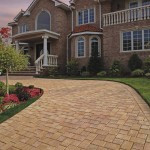Knowing the pavement facts helps customers make right choices
June 26, 2012During economically challenging times, consumers are more prone to making compromising decisions largely because of cost factors and/or lack of understanding of their options to the fullest degree. With this cause and effect in mind, landscape contractors can be faced with positive or negative results from sales calls that come from the poor judgment of their homeowner-customers. For example, when discussing a new pavement, the homeowner may be inclined to choose the wrong pavement material because the cost is perceived to be lower without considering other points worth noting such as aesthetics, long-term maintenance, lifespan and return on investment (ROI).

“Leveraging a full breadth of product knowledge in pavement types is the best way to educate the customer and lead them down the right path,” says Cambridge Pavers Chairman & CEO Charles H. Gamarekian. Cambridge is one of the foremost manufacturers of interlocking concrete pavers on the east coast and Gamarekian is a founder of the Interlocking Concrete Pavement Institute (ICPI). The Institute publishes a leaflet titled The Beauty of Choosing the Best Pavement, which contains an in-depth comparison of concrete pavers to alternative pavements, namely poured and stenciled concrete, cobblestone, clay pavers, asphalt and crushed stone and gravel.
Along with Gamarekian, ICPI offers credible facts to support why concrete pavers provide the best buy for homeowners looking to have a pavement installed for a patio, pool deck, driveway, walkway or outside staircase and landing. According to Gamarekian, presenting the facts to the customer in a logical fashion can not only enhance their respect for you as a professional, but result in a far better value for them as your highly-regarded customer. Following are some facts excerpted from the publication:
For instance, asphalt, probably the most frequently considered pavement especially for driveways, will suffer surface breakdown from weather and wear, which requires black seal coating every two to three years in addition to the necessity for unsightly patching to maintain a desired visual appearance. These maintenance factors must be taken into consideration.
With poured concrete, also one of the most popular pavements, the homeowner must allow five to seven days for hardening. When choosing an interlocking concrete pavement, the pavement is ready for use upon completion. The surface quality of poured concrete can be affected by weather at the time the concrete is poured and by the expertise of the installer. Although due to the smooth surface, snow removal is easy, cracking and deterioration will likely develop also over time from freeze/thaw conditions and the repeated use of de-icing salts. Concrete pavers are resistant to de-icing salts and damage from snow plowing.
Stamping is a technique that is used to create a pattern in poured concrete but special equipment is required. Again, cracking will likely develop making it difficult to match the original color or pattern after the restoration is completed. Also patterns may look good from a distance but may look artificial when closer. Concrete paver patterns, which are almost unlimited, are artfully created by the installer and should have natural, even joint lines.
Some homeowners opt for cobblestone in an effort to accomplish an “old world” feel, whereas concrete pavers with aging and distressing achieved in the manufacturing process may provide a less expensive and equally desired result. With cobblestones each unit must be fitted by hand — a time consuming task. Unlike with paver installations, widely spaced joints may encourage weed growth and ant mines. Homeowners should also be prepared for a rough surface making walking and driving difficult.

Without looking into alternatives, clay pavers (a.k.a. clay bricks) are also the choice of those seeking a vintage appearance for their pavements. Unlike concrete pavers, shapes and colors are very limited. Here a concrete base may also be required, which increases the cost but can protect against future, ground settling issues. Because of their inconsistent dimensions, bricks are slow and somewhat difficult to install whereas concrete pavers offer tightly fitted patterns set over a sand bed and compacted aggregate base. Factory made concrete pavers can last for decades without cracking or splitting. Cambridge offers a 4 x 8 Holland shape from the company’s Renaissance Collection as an ideal alternative to clay brick with the same aesthetic appeal but with the added strength, durability, lasting beauty and other benefits of a Cambridge concrete paver.
Crushed stone or gravel driveways, although rustic looking, will eventually have ruts from tire tracks and bare spots from the scattering of stones from driving over it and snow plowing.
As a hardscape professional, emphasize that durability should be a prime factor when choosing a pavement and that includes retention of original color over years of use. Concrete pavers assure best results here as well. Premium quality brands such as Cambridge Pavingstones with smooth, abrasion-resistant surfaces and rich ArmorTec® colors that do not fade will provide a good return on investment (ROI) for your customers.
Knowledge can and will make a big difference in achieving your sales goals. For a free copy of The Beauty of Choosing the Best Pavement, contact Cambridge Pavers Inc. at cambridgepavers.com.
